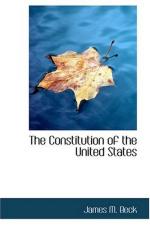At the close of the convention its records were committed into the keeping of Washington, with instructions to “retain the journal and other papers, subject to order of Congress, if ever formed under the Constitution.”
Even the journal consisted of little more than daily memoranda, from which the minutes ought to have been, but never were, made; and these fragmentary records of the proceedings of a convention which had been in continuous session for nearly four months were never published until the year 1819, or thirty-two years after the close of the convention. Thus, the American people knew nothing of their greatest convention until a generation later, and then only a few bones of the mastodon were exhibited to their curious gaze.
The members of the convention kept its secrets inviolate for many years. With few exceptions, the great secrets of the convention died with them. Only one, James Madison, left a comprehensive statement of the more formal proceedings. With this notable exception, only a few anecdotes, handed down by tradition, escaped oblivion. The first of the number to break the pledge of secrecy was Robert Yates, Chief Justice of New York, who, in 1821, published his recollections; but, as he had left the convention a few months after it began, his notes ceased with the 5th of July.
The world would thus have been for ever ignorant of the details of one of the most remarkable conventions in the annals of mankind had it not been that one of the ablest of their number, James Madison, regularly attended the sessions and kept notes from day to day of the debates. While he was not a stenographer, he had a gift for condensing a speech and fairly representing its substance. He jealously guarded his Journal of the Convention until his death. Its very existence was known to few. He died in 1836, and four years later the government purchased the manuscript from his widow. Then, for the first time, the curtain was measurably raised upon the proceedings of a convention which had created, as we now know, one of the greatest nations in history. Fifty-three years after the close of the convention, and when nearly every one of its participants were dead, Madison’s Journal was first published.
When was a great secret better kept? Grateful as posterity must be for this inestimable gift of great human enterprise, yet even Madison’s careful journal fills one with the deepest regret that this wonderful debate, which lasted for nearly four months between men of no ordinary ability, could not have been preserved to the world.
Two or three of the speeches which Madison gives in his Journal are complete, for when Doctor Franklin spoke he reduced his remarks to writing and gave a copy to Madison, but of the other speeches only a fragrant remains. Thus, that “admirable Crichton,” Alexander Hamilton, addressed the convention in a speech that lasted five hours, in which he stated his philosophy of government, but of that only a short condensation, and possibly not even an accurate fragment, remains.




